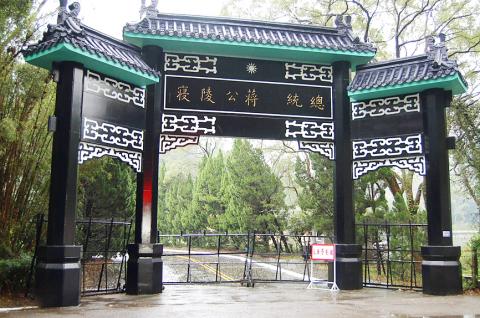A senior government official yesterday warned that the mausoleum of former president Chiang Ching-kuo (蔣經國) might be in danger due to its proximity to a faultline.
The bodies of Chiang Kai-shek (蔣介石) and his son Chiang Ching-kuo were not buried. Chiang Ching-kuo’s body was preserved at a mausoleum in Taoyuan’s Dasi District (大溪) and Chiang Kai-shek’s remains were entombed at a mausoleum in Tzuhu (慈湖).
Both mausoleums are old and require a lot of money to repair, said the official, who declined to be named, adding that repairs last year to the Chiang Ching-kuo mausoleum cost NT$13.2 million (US$408,289), while the Tzuhu mausoleum cost NT$10.4 million.

Photo: Tsai Chia-yen, Taipei Times
The official said that Chiang Ching-kuo building has cracks and has leaked since its commissioning in 1988 and the structure is slowly deteriorating.
Another point of concern is that the Chiang Ching-kuo site is only 195m from the Sindian faultline, which passes through the entire Taoyuan area, the official said, adding that the government has yet to make a complete assessment of the area after the 921 Earthquake in 1999.
“We are still uncertain whether the area around the mausoleum suffers from subsidence and without that assessment, we cannot make plans or changes to the design,” the official said.
The Sindian faultline runs through northern Taiwan, including Sindian District (新店) in Taipei, which gives it the name. The southern tip of the fault is in Dasi.
The Presidential Office and the Ministry of National Defense’s Reserve Command jointly said that should the Chiang family make a decision, the public cemetery on Wuchih Mountain (五指山) in New Taipei City’s Sijhih District (汐止) has been set up to hold the bodies.
The “Chiang Ling” (Chiang Tomb, 蔣陵) — the first of its kind built on government land using government funds — was completed in 2005 following talks with the Chiang family about moving the bodies. It features a plaque hung over the entrance, which is a Chinese-style archway, reminiscent of imperial China.
Spaces inside the site for epitaphs and commendations have been left blank.
The Chinese word ling is usually reserved for nobility and royals in ancient China, while the word grave or tomb is usually denoted by the Chinese word fen mu (墳墓).
The construction of the Chiang Ling cost NT$31.4 million.
Since the passing of Chiang Kai-shek’s wife, Soong Mayling (宋美齡), in 2003, the family has lacked an individual who can make decisions on behalf of the whole family, the official said.
Despite multiple efforts by all levels of the government, the Chiang family remains divided on the issue of moving the bodies, the official said, adding that after being unused for 11 years, the Wuchih Mountain site might remain that way for years to come.

A preclearance service to facilitate entry for people traveling to select airports in Japan would be available from Thursday next week to Feb. 25 at Taiwan Taoyuan International Airport, Taoyuan International Airport Corp (TIAC) said on Tuesday. The service was first made available to Taiwanese travelers throughout the winter vacation of 2024 and during the Lunar New Year holiday. In addition to flights to the Japanese cities of Hakodate, Asahikawa, Akita, Sendai, Niigata, Okayama, Takamatsu, Kumamoto and Kagoshima, the service would be available to travelers to Kobe and Oita. The service can be accessed by passengers of 15 flight routes operated by

MORE FALL: An investigation into one of Xi’s key cronies, part of a broader ‘anti-corruption’ drive, indicates that he might have a deep distrust in the military, an expert said China’s latest military purge underscores systemic risks in its shift from collective leadership to sole rule under Chinese President Xi Jinping (習近平), and could disrupt its chain of command and military capabilities, a national security official said yesterday. If decisionmaking within the Chinese Communist Party has become “irrational” under one-man rule, the Taiwan Strait and the regional situation must be approached with extreme caution, given unforeseen risks, they added. The anonymous official made the remarks as China’s Central Military Commission Vice Chairman Zhang Youxia (張又俠) and Joint Staff Department Chief of Staff Liu Zhenli (劉振立) were reportedly being investigated for suspected “serious

ENHANCING EFFICIENCY: The apron can accommodate 16 airplanes overnight at Taoyuan airport while work on the third runway continues, the transport minister said A new temporary overnight parking apron at Taiwan Taoyuan International Airport is to start operating on Friday next week to boost operational efficiency while the third runway is being constructed, the Ministry of Transportation and Communications said yesterday. The apron — one of the crucial projects in the construction of the third runway — can accommodate 16 aircraft overnight at the nation’s largest international airport, Minister of Transportation and Communications Chen Shih-kai (陳世凱) told reporters while inspecting the new facility yesterday morning. Aside from providing the airport operator with greater flexibility in aircraft parking during the third runway construction,

American climber Alex Honnold is to attempt a free climb of Taipei 101 today at 9am, with traffic closures around the skyscraper. To accommodate the climb attempt and filming, the Taipei Department of Transportation said traffic controls would be enforced around the Taipei 101 area. If weather conditions delay the climb, the restrictions would be pushed back to tomorrow. Traffic controls would be in place today from 7am to 11am around the Taipei 101 area, the department said. Songzhi Road would be fully closed in both directions between Songlian Road and Xinyi Road Sec 5, it said, adding that bidirectional traffic controls would